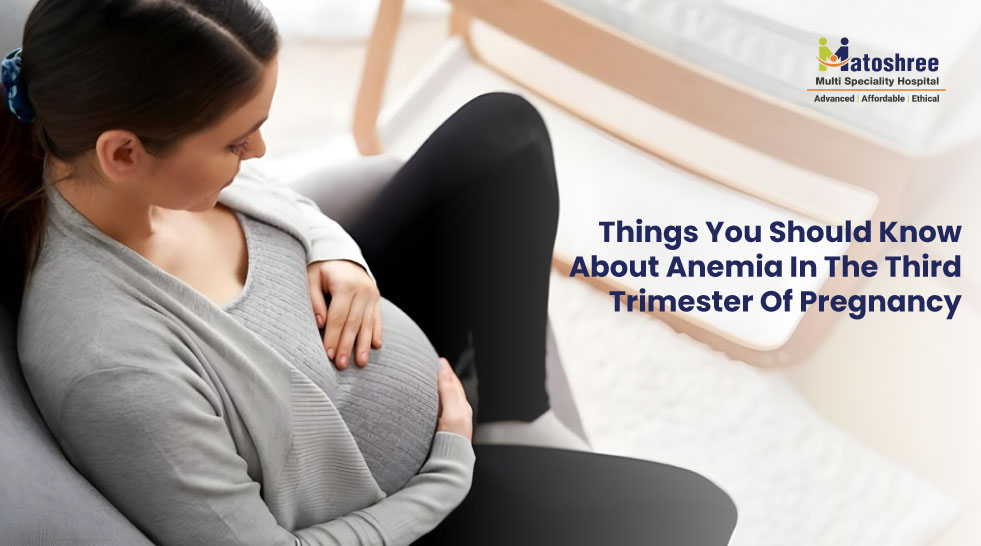Things You Should Know About Anemia in the Third Trimester of Pregnancy

During pregnancy, you will experience many changes to your body, so it is a journey that surprises almost everyone. By the third trimester, you may have noticed that your body has been working exceptionally hard already. A lot of the time during pregnancy you are only reacting to changes. Your blood volume has increased a lot, and your iron stores in your body may be at low levels. Inadequate iron levels can be one of the most common health issues in late pregnancy that we term anemia. It is important to know what anemia or low hemoglobin pregnancy is, why it occurs, and what you can do about it, not only for yourself but for your baby as well. Maintaining a normal Hb level is crucial during this time. You can minimize risk and be more comfortable in these last few months of pregnancy with the right information.
What happens if you have anemia during the third trimester of pregnancy?
It is not uncommon for women to experience life with anemia during pregnancy in the third trimester as their everyday activity may feel even more exhausting than usual. Climbing stairs or simply walking around the house might require you to stop and catch your breath. You may feel dizzy, have shortness of breath, be pale, or have a fast heartbeat. Low iron levels affect the body's ability to develop hemoglobin, which is a critical part of the blood that carries oxygen around your body. Without adequate oxygen flow to you and your baby, you put yourself (and your baby) at risk for complications. Anemia Meaning in Marathi is रक्ताल्पता, and it highlights how the condition reduces the number of healthy red blood cells. Anemia can hinder your baby's growth, increase the risk of low birth weight, or put the baby at risk of impairment if severe. Anemia can also increase the chance of the mother being involved in an accident due to fatigue, increase the chance of postpartum depression, and lead to complications during delivery (such as a blood transfusion). Identifying anemia early and addressing it can help you feel better for the remainder of your pregnancy and improve your overall health during this critical time.
How is anemia diagnosed in the third trimester?
Doctors usually diagnose anemia with simple blood tests that are commonly included in routine prenatal checkups. Initially, your hemoglobin levels are measured, and in some cases, you may also have a hematocrit test to measure the proportion of red blood cells in your blood. The results of these tests will indicate the severity of anemia. Your doctor will also consider diet, general health, and previous history of anemia or heavy bleeding. They may ask you questions regarding your energy levels, sleep quality, and how short of breath you feel. Sometimes, tests are ordered to determine if the anemia is caused by iron deficiency; vitamin B12 deficiency; or folate deficiency. It's also important to regularly assess your levels in the third trimester to ensure you catch any decline in red blood cells. At this time, your body needs iron more than at any other time during pregnancy, and catching anemia in the early stages can make a difference.
What causes anemia during the third trimester of pregnancy?
The most typical cause of anemia in the third trimester of pregnancy is iron deficiency. Your body needs much more iron during pregnancy to make the extra red blood cells and supply oxygen for the developing fetus. If you do not consume enough iron in your diet, or if your body is unable to absorb it, you might have anemia. Anemia could also be caused by deficiencies of other nutrients, like vitamin B12 and folate. Certain health conditions may increase your risk for anemia, such as chronic infection or gastrointestinal problems that do not allow your body to absorb nutrients. If you are carrying twins (or more), your anemia risk can also be higher, because your body is meeting the needs of two (or more) developing babies. Even prior blood loss, heavy periods before pregnancy, or closely spaced pregnancies can make iron stores low, increasing the chances of anemia. Knowing the cause will help your healthcare provider determine the most appropriate treatment plan.
What is the treatment for anemia during the third trimester of pregnancy?
Treatment for anemia will depend on the severity and reason for the anemia. Generally, anemia is treated with a combination of medical treatment and lifestyle changes. The goal is to increase red blood cell count and return the iron and nutrient levels to the normal range to support the health of the mother and fetus.
Medical treatment
For mild and moderate anemia, a physician will typically prescribe an iron supplement of some sort, either a pill or liquid. Iron supplements can assist in blood stores as well as help with hemoglobin production. Sometimes vitamin C is recommended with iron to aid in absorption. In cases where anemia is severe or does not respond to oral supplements, intravenous iron may be administered. A few women might even require a blood transfusion if hemoglobin levels are dangerously low. Consistent follow-ups are important to assess progress. The focus should be on trying to get treatment early so anemia doesn't affect delivery or the health of the baby.
Home Remedies
Home remedies and lifestyle changes can complement medical treatment or be preventative against anemia. You should eat iron-rich foods. Adding leafy green vegetables like spinach, iron-fortified cereals, lentils, beans, and lean meats like chicken and fish to your diet are good examples. You can improve how your body absorbs iron from these foods by adding vitamin C-rich foods, such as orange or guava fruits and tomato veggies. It is good to avoid drinking tea and coffee immediately after meals, as that will adversely affect the absorption of iron by your body. Eating small and frequent meals and a balanced overall diet with sufficient protein will help to maintain high energy levels. Remember to rest and recover. Taking breaks throughout the day, staying hydrated with water, and doing light prenatal exercise will assist with circulation and overall body well-being. Home remedies may not replace medical care, but they support medical care and make recovery easier.
Conclusion
It's common for pregnant women to have anemia during the third trimester, but it is manageable if you pay close attention to it. You can catch it early by noticing indicators such as fatigue, dizziness, and pale skin. Having regular blood tests and monitoring your diet with a variety of nutrients, along with following your doctor's advice, will have a lot to do with having a safe pregnancy. With some education on the causes of anemia, noticing the symptoms, and doing your part to move forward, you will be accomplishing well-being for yourself and your baby. Low hemoglobin pregnancy doesn't have to hijack your last months if you pay attention. and allow yourself to prepare for a healthy and safe delivery.





















 (1).png)